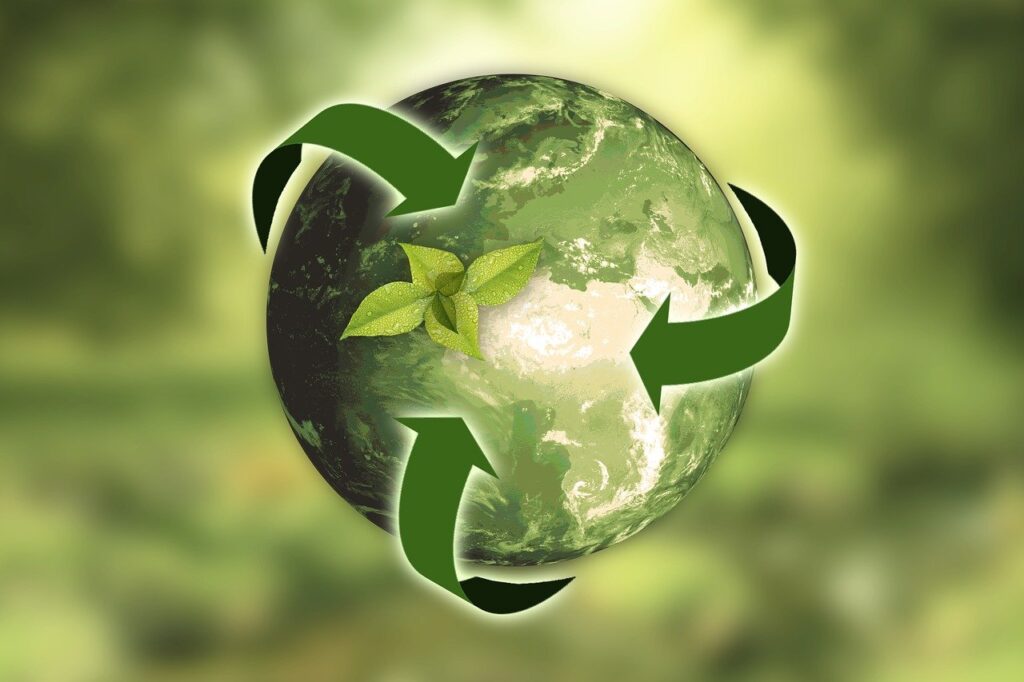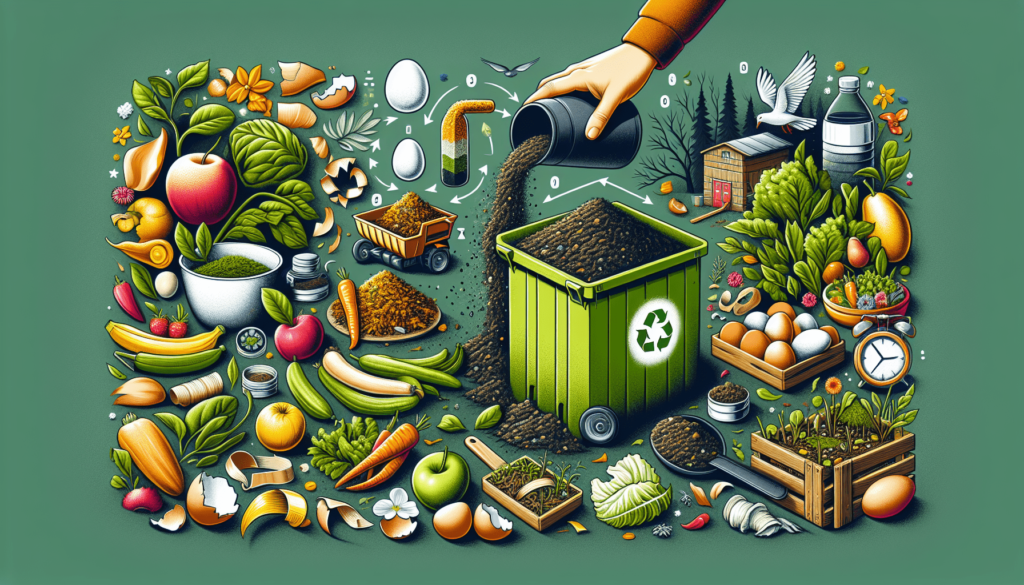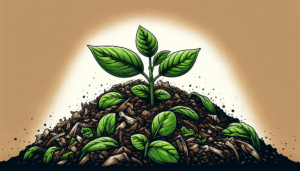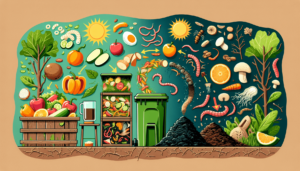Composting, a process that turns organic waste into nutrient-rich soil, plays a vital role in safeguarding our environment. By diverting organic waste from landfills, composting reduces methane emissions, a potent greenhouse gas. This sustainable practice also helps conserve water, improves soil quality, and reduces the need for chemical fertilizers. In this article, we will explore the numerous benefits of composting and shed light on how this simple yet impactful practice positively impacts the environment.

Reduces Landfill Waste
Composting plays a crucial role in reducing landfill waste. When organic waste is disposed of in landfills, it decomposes anaerobically, leading to the release of methane gas, a potent greenhouse gas. By composting organic waste instead, we can prevent it from ending up in landfills. This not only decreases the amount of waste that accumulates in landfills but also reduces the emission of methane gas.
Furthermore, composting helps conserve landfill space. Landfills are quickly filling up and reaching capacity in many areas. By diverting organic waste from landfills through composting, we can help extend the lifespan of existing landfills and reduce the need for constructing new ones. This is a significant benefit in areas where finding suitable locations for landfill construction is becoming increasingly challenging.
Reduces Greenhouse Gas Emissions
Composting makes a substantial contribution to reducing greenhouse gas emissions, particularly methane and carbon dioxide. Methane is released during the anaerobic decomposition of organic waste in landfills, with methane being approximately 25 times more potent as a greenhouse gas than carbon dioxide. By composting organic waste, we create an aerobic environment that promotes the decomposition of organic matter without producing significant amounts of methane.
In addition to minimizing methane emissions, composting also helps decrease carbon dioxide emissions. When organic waste decomposes anaerobically in landfills, it releases carbon dioxide, contributing to climate change. Composting, on the other hand, facilitates the breakdown of organic matter in an oxygen-rich environment, resulting in reduced carbon dioxide emissions. Thus, composting acts as an effective measure in combatting global warming.

Improves Soil Quality
One of the significant benefits of composting is its positive impact on soil quality. Compost is a nutrient-rich soil amendment that adds essential nutrients to the soil. As the organic matter in compost decomposes, it releases nutrients such as nitrogen, phosphorus, and potassium, which are vital for plant growth. When we regularly add compost to our soil, we provide a continuous source of these nutrients, contributing to the overall fertility of the soil.
Moreover, compost enhances soil structure and fertility. The organic matter found in compost improves the soil’s texture, making it more friable and better able to retain moisture. This improved soil structure allows for better root development and nutrient uptake by plants. Additionally, the increased water retention capacity of soil enriched with compost helps reduce water runoff and erosion, benefiting both the environment and agricultural productivity.
How Does Composting Help The Environment?
Promotes Sustainable Agriculture
Composting plays a crucial role in promoting sustainable agriculture by providing organic fertilizer. Chemical fertilizers, commonly used in conventional farming practices, can have detrimental effects on the environment. By utilizing compost as a natural and organic alternative, we can reduce our reliance on synthetic fertilizers. Compost provides a balanced mix of nutrients and organic matter that nourishes the soil and enhances plant growth, resulting in healthier and more productive crops.
In addition to replacing synthetic fertilizers, composting also enhances crop yields. The nutrients and organic matter present in compost contribute to the overall health of plants, making them more resilient to diseases and pests. Compost also helps improve soil fertility, ensuring that plants receive the necessary nutrients for optimal growth. By incorporating compost into agricultural practices, farmers can effectively increase their crop yields and achieve long-term sustainability.

Minimizes Water Pollution
Composting helps minimize water pollution by reducing nutrient runoff into water bodies. When synthetic fertilizers are used in excess, they can leach into the soil, eventually making their way into nearby rivers, lakes, and streams. This nutrient runoff can lead to harmful algal blooms, oxygen depletion, and overall degradation of water quality. However, by using compost as a natural fertilizer, we can reduce the reliance on synthetic fertilizers and subsequently decrease the risk of water pollution.
In addition to decreasing nutrient runoff, composting also preserves water quality. The organic matter present in compost helps improve soil structure, enabling it to retain water more effectively. This increased water retention capacity reduces the amount of water that runs off the soil’s surface, carrying pollutants along with it. By maintaining water quality, composting contributes to the overall health of aquatic ecosystems and ensures the availability of clean and safe water for both humans and wildlife.
Saves Energy
One often overlooked benefit of composting is its ability to save energy. Composting reduces the energy required for waste transportation. The process of collecting and transporting organic waste to landfills requires significant energy resources, including fuel for vehicles. By composting organic waste locally, we eliminate the need for long-distance transportation, thereby reducing energy consumption and the associated greenhouse gas emissions from fossil fuels.
Furthermore, composting also minimizes the need for chemical fertilizers and pesticides. Synthetic fertilizers and pesticides are energy-intensive to produce and distribute. By utilizing compost as a natural fertilizer, we reduce the demand for these chemical inputs in agriculture. This not only saves energy but also helps protect the environment from the negative impacts associated with the production and use of synthetic chemicals.

Reduces the Need for Landfill Sites
Composting significantly lowers the demand for new landfill construction. As mentioned earlier, existing landfills are filling up at an alarming rate, prompting the need for new landfill sites. By diverting organic waste from landfills and composting it instead, we can help reduce the quantity of waste that requires disposal in landfills. This, in turn, extends the lifespan of existing landfills and minimizes the necessity for constructing new ones, ultimately saving valuable land resources.
By embracing composting practices, we can make a positive impact on our communities and environment by reducing waste, conserving landfill space, and preserving our natural resources.
Diverts Organic Waste from Incinerators
Composting helps divert organic waste from incinerators, thereby preventing air pollution. When organic waste is incinerated, harmful substances are released into the atmosphere, contributing to air pollution and negatively impacting human health. By composting organic waste, we eliminate the need for incineration, reducing the emission of these harmful substances and improving air quality.
Additionally, composting reduces the emission of greenhouse gases from incineration. Burning organic waste releases carbon dioxide and other greenhouse gases into the atmosphere, contributing to climate change. By composting instead of incinerating, we eliminate these emissions, making the composting process far more environmentally friendly.
Protects Biodiversity
Composting plays a vital role in protecting biodiversity by preserving natural habitats and reducing land degradation. Landfills, which accumulate large amounts of waste, can cause significant harm to the environment, including the destruction of natural habitats. By diverting organic waste from landfills through composting, we help reduce the need for landfill expansion and mitigate the loss of natural habitats, preserving biodiversity.
Moreover, by improving soil quality and fertility, composting supports diverse ecosystem functions. Healthy soils resulting from the addition of compost provide a thriving habitat for various microorganisms, fungi, and beneficial insects. This biodiversity within the soil plays a crucial role in nutrient cycling, plant growth, and overall ecosystem balance. By composting and promoting healthy soils, we contribute to the preservation and restoration of biodiversity.
Educates and Raises Awareness
Composting not only provides tangible environmental benefits but also serves as an educational tool to raise awareness about environmental issues and promote sustainable practices. By engaging in composting activities, individuals and communities become more conscious of the environmental impact of their waste and the importance of waste reduction.
Additionally, composting promotes environmentally friendly practices beyond waste management. People who compost often adopt other sustainable habits, such as conserving water and energy, reducing plastic consumption, and supporting local and organic food production. Composting serves as a stepping stone towards a more environmentally conscious lifestyle, empowering individuals to take action and make a positive difference in their communities.
In conclusion, composting offers numerous benefits for the environment. From reducing landfill waste, greenhouse gas emissions, and water pollution to improving soil quality, promoting sustainable agriculture, and protecting biodiversity, composting is a valuable practice that fosters a healthier and more sustainable planet. By embracing composting on a larger scale and encouraging its adoption in our communities, we can create a positive impact and work towards a greener future.




